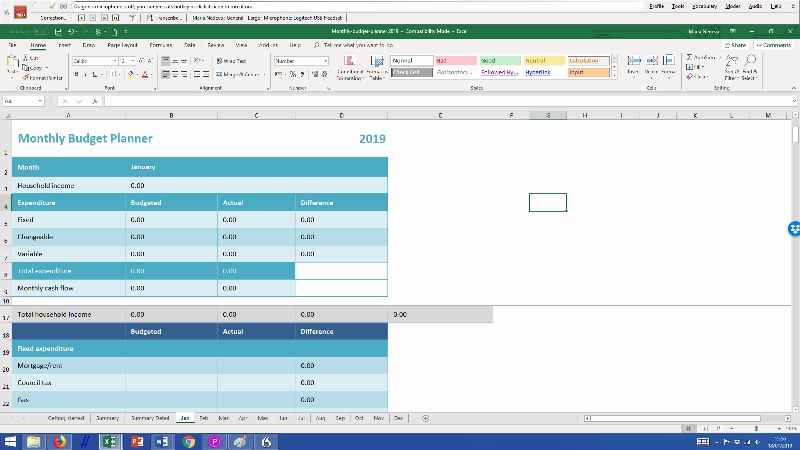Money habits are important. Don’t believe me?
Do you feel like you’re always one bill away from financial disaster?
You’re probably thinking, “Why can’t I get a handle on this? Why am I always broke?”
It is frustrating, I know. Because I’ve been there.
This is how I know that achieving financial stability and security is not a matter of catching a break but an issue of correcting the damaging money habits you may have.
Prosperity is simple. Good habits pave the road to financial stability. Bad habits will sink you deeper in the swamp of broke.
Now, let me share the money habits that keep you broke.
Do you want to stop living hand to mouth?
Ditch these financial habits.
25 Bad Money Habits That Keep You Broke
Here are 25 bad money habits that keep you broke.
#1. Living Beyond Your Means
This is when you spend more than you earn. It keeps you broke by accumulating debt, with no spare income for savings or investments.
To change:
- Review your spending and ensure it doesn’t exceed your income. You can either cut spending or increase your income.
- Write monthly savings into your budget and stick to it.
#2. Not Having a Budget

This means you’re not tracking your income and expenses.
It keeps you broke as you’re unaware of your spending habits.
To change:
- Track your income and expenses.
- Review your budget regularly and adjust as needed.
#3. Failing to Save for the Future
This means not setting aside money for future needs.
This keeps you broke because unexpected expenses can arise, forcing you into debt. To change:
- Build an emergency fund.
- Create a regular savings and investment plan.
#4. Ignoring Bills and Due Dates
This involves forgetting or intentionally not paying bills on time.
It can lead to extra charges and a poor credit score.
To change:
- Set reminders for bills’ due dates.
- Automate payments.
#5. Not Having an Emergency Fund
This is not having savings for unexpected expenses.
It can force you to take loans during emergencies, leading to debt. Knowing that you cannot cover even small emergencies is also extremely stressful.
To change:
- Set aside a fixed amount monthly in an ‘emergency’ account.
- Keep this account at a level sufficient to cover basic household emergencies.
#6. Not Investing for the Future
This means not putting money into ventures that could yield returns.
It keeps your money stagnant without growth.
To change:
- Learn about investing.
- Start small and simple.
- Open an investing account with a digital wealth manager and contribute monthly.
#7. Compulsive Shopping or Gambling

Photo by Michał Parzuchowski on Unsplash
This involves spending money impulsively on unnecessary items or betting.
It drains your finances rapidly.
To change:
- Seek professional help to deal with addiction.
- Practice mindful spending.
#8. Paying High Fees and Charges
This means paying more than necessary for services.
It reduces your disposable income.
To change:
- Negotiate bills.
- Avoid late fees.
- Switch to cost-effective services.
#9. Not Negotiating Bills and Expenses
This means accepting initial charges without bargaining.
It leaves less disposable money for savings. And overpaying is wrong on principle.
To change:
- Learn to negotiate.
- Compare prices before purchasing.
#10. Not Taking Advantage of Employer Benefits
This involves not fully using the benefits provided by employers, like retirement plans and discounts.
It can cost you dearly in the long run.
To change:
- Understand the benefits offered by your employer.
- Use these benefits fully.
#11. Not Considering the Long-Term Impact of Financial Decisions
This means making financial choices without considering future implications. It can lead to financial instability.
To change:
- Consider consequences before making financial decisions.
- Make it a habit.
#12. Not Educating Oneself About Personal Finance

This involves not knowing basic financial management.
It can lead to bad financial decisions.
To change:
- Read financial books.
- Attend seminars.
- Take online courses.
#13. Carrying High-Interest Debt
This means having debts with high-interest rates like credit cards, high-interest loans, payday loans etc.
It can drain your income.
To change:
- Prioritise paying off high-interest debts.
- Avoid incurring such debts.
- Restructure and consolidate your debt.
#14. Not Diversifying Investments
This involves putting all your money into one type of investment.
It can lead to a substantial loss if the investment fails.
To change:
- Spread your investments over investment classes.
#15. Not Reviewing or Updating Financial Plans
This means not revisiting your financial goals and plans regularly.
It can derail your financial stability.
To change:
- Review your financial plans regularly.
#16. Not Protecting Against Identity Theft
This involves not safeguarding personal information.
It can lead to financial loss and a whole host of other problems.
To change:
- Install security software.
- Monitor your accounts.
- Keep personal information secure.
#17. Not Seeking Professional Advice
This means trying to navigate complex financial matters alone.
It can lead to poor financial decisions.
To change:
- Consider consulting a financial advisor for major decisions.
#18. Not Shopping Around for the Best Deals
This involves making purchases without comparing prices.
It leads to overspending, which can drain your resources.
To change:
- Compare prices before buying, especially for big-ticket items.
- Search for deals.
#19. Not Being Mindful of Taxes
This means not considering the tax implications of your income and investments. It can lead to hefty tax bills and penalties.
To change:
- Educate yourself about tax
- Hire a tax advisor.
- Invest in tax advantages accounts.
#20. Not Having Adequate Insurance Coverage
This means not having sufficient protection for health, property, or life.
It can lead to significant financial loss in case of emergencies.
To change:
- Review your insurance needs regularly and ensure you have adequate coverage.
#21. Keeping Up with the Joneses
This involves comparing your lifestyle to others and trying to match or surpass them.
It can lead to overspending and debt.
To change:
- Focus on your financial goals.
- Avoid unnecessary comparisons.
#22. Impulse Buying
This means making unplanned purchases.
It can drain your budget and savings.
To change:
- Use a shopping list and stick to it.
- Avoid spending just because something’s on sale.
- Leave yourself time to think before you buy.
#23. Not Tracking Expenses
This involves not keeping tabs on your daily spending.
It can lead to overspending and budgeting inaccuracies.
To change:
- Log in your daily expenses.
- Review them regularly.
#24. Using Credit to Finance a Lifestyle
This means living a lifestyle beyond your means and using credit to finance it.
It can lead to hefty debt and financial instability.
To change:
- Live within your means.
- Use credit wisely.
#25. Not Giving Back to the Community
This involves not considering charitable contributions as part of your financial planning.
It does not directly keep you broke, but sharing with the community can provide satisfaction and well-being.
To change:
- Consider including charitable giving in your budget.
Transform These Bad Money Habits and Let Your Journey to Prosperity Begin
Whew, that’s a lot to take in, isn’t it?
But you’ve just had your first win against broke – you know the habits you must change.
It will take more learning, persistence, and dedication. But it is worth it for no more sleepless nights worrying about bills, living hand to mouth, and feeling lost in money matters.
Because every long journey starts with a single step, I want you to select one bad money habit. Work on it, change it and when done, move on.
Your financial security awaits at the end of it!
Photo by Towfiqu barbhuiya on Unsplash
